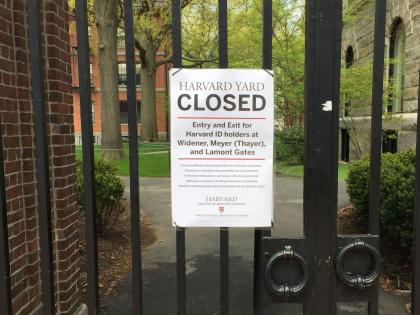Following its December discussion of a proposal to eliminate Harvard College course credit for Advanced Placement (AP) and International Baccalaureate (IB) courses—thereby limiting students’ ability to fast-track their A.B. or graduate with a simultaneous master’s, typically in a sciences or engineering field (see “Overhauling Advanced Standing,” March-April, page 22)—the Faculty of Arts and Sciences (FAS) accepted an amended course of action at a sparsely attended meeting on February 6.
Taking into account concerns raised in December, dean of undergraduate education Jay M. Harris introduced a scrubbed-down policy. Beginning with students entering the College in 2020, course credit would no longer be awarded “for work completed prior to their matriculation,” except for credits earned at Harvard’s extension or summer schools. This would extend the practice already in place in all departments except economics, mathematics, and psychology (which in effect recognize top scores in AP or IB classes as a substitute for introductory College courses in those disciplines). Departments would be allowed to continue using AP and IB examinations for course placement—and (the one exception) to satisfy the undergraduate foreign-language requirement. A separate committee would be formed to recommend rules and procedures for undergraduates hoping to pursue a concurrent master’s degree in the Graduate School of Arts and Sciences; it would report within a year.
Harris observed that across most of FAS, AP and IB classes are regarded as not equivalent to the work required in College classes—so it makes no sense to allow students to count them toward earning an A.B. short of Harvard’s “curated eight-semester experience.”
Faculty members present raised several concerns. First, the change would eliminate the opportunity to graduate in six or seven semesters—an option that might appeal to a very few students with compelling personal or family financial or health concerns, or unique intellectual trajectories. Peer institutions permit accelerated undergraduate studies, so Harvard might unilaterally weaken its appeal to such applicants. The change also seems at odds with efforts nationwide to make college studies more flexible, affordable, and accessible. Finally, the proposal continues to let students circumvent the language requirement, at least in terms of instruction in the College.
Harris, a self-proclaimed “language hawk” (he is Wolfson professor of Jewish studies), said the final point merited further study—but added that foreign-language requirements have been reviewed in the relatively recent past and are governed by separate legislation. As for the other concerns, he emphasized the value of as complete an undergraduate experience as possible; the inappropriateness of “cheapening” the four-year degree; and the inequity of granting advanced standing to the minority, perhaps 30 percent, of undergraduates whose AP or IB credits make them eligible, while making it impracticable for those who do not.
With the promise of further study on accommodating concurrent bachelor’s and master’s degrees, the faculty members present approved the policy by voice vote.







